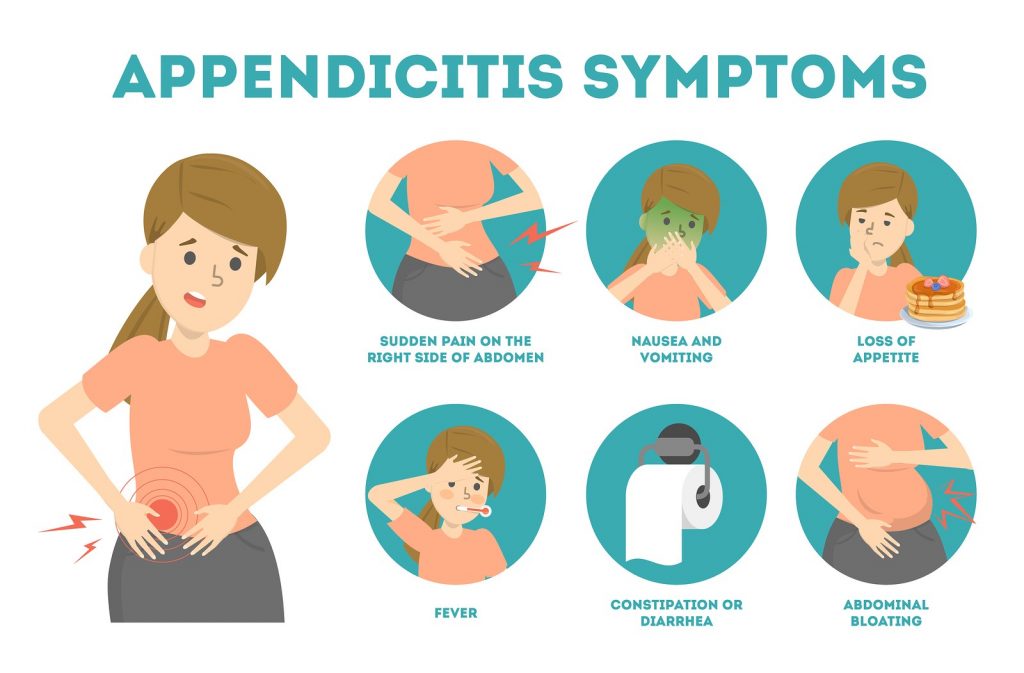
Appendicitis is an inflammatory condition where the appendix becomes inflamed. The appendix is a small, finger-shaped appendage to your large intestine. A blockage of the opening of the appendix, usually caused by feces, foreign bodies, inflammation, or cancer, causes bacteria to build up and become inflamed. This causes the wall of the appendix to swell, causing pain that usually starts near the belly button and migrates to the right side of the abdomen.
Appendicitis is a very common condition and is the leading cause of emergency surgery. Although appendicitis can occur at any age, it is most common in younger people, between the ages of 10 and 30.
Also, undetected or underdiagnosed appendicitis can be dangerous because the appendix can rupture, causing a serious infection called peritonitis, or an abscess. Therefore, if there are suspicions of appendicitis, it is necessary to consult a doctor as soon as possible.
What causes appendicitis?
The causes of appendicitis are not entirely clear, but the main cause of the condition is thought to be a blocked opening of the appendix. A blockage can be caused by feces, a foreign body, inflammation, or cancer. In this case, bacteria accumulate in the appendix, which causes inflammation and thus appendicitis and its symptoms can occur.
Appendicitis is a very common condition and is one of the main reasons for emergency surgery. Statistics show that about 7-8% of the population faces appendicitis during their lifetime.
Appendicitis can occur at any age, but it mostly affects young people, between the ages of 10 and 30. However, there are certain risk factors that can increase the risk of appendicitis. This can be due to certain diseases, such as Crohn's disease, or a family history.
However, despite the fact that appendicitis is a very common condition, it is important to note that early diagnosis and treatment are usually successful and patients recover quickly.
Symptoms
Appendicitis presents with symptoms that can vary from person to person and depending on whether the appendix has ruptured. However, there are some symptoms that are common in appendicitis.
The first and most common symptom is pain that starts at the navel and migrates to the right side of the abdomen. The pain may become more intense when moving, coughing or taking a deep breath. Other symptoms of appendicitis may include:
Loss of appetite
Nausea or vomiting
Constipation or diarrhea
Fever
Flatulence
Difficulty passing gas.
Appendicitis is usually caused by a blocked opening of the appendix. A blockage can be caused by feces, foreign bodies, inflammation, or cancer. When the opening of the appendix becomes blocked, it causes bacteria to build up and become inflamed, resulting in appendicitis and its symptoms.
Although appendicitis can occur at any age, it is most common in younger people, between the ages of 10 and 30. Regardless, anyone with symptoms of appendicitis should see a doctor as soon as possible.

How is appendicitis diagnosed?
Appendicitis can be difficult to diagnose because its symptoms can be similar to other conditions, such as bladder inflammation and bowel problems. However, doctors use different methods to diagnose appendicitis.
Your doctor will start with a history of your symptoms and a physical exam, which may include testing for pain sensitivity on the right side of your abdomen. A urine test may also be done to rule out other conditions, such as a urinary tract infection, or blood tests that can show if there is inflammation in the body.
Abdominal ultrasound, computed tomography (CT), or magnetic resonance imaging (MRI) can help confirm the diagnosis. These tests allow the doctor to see the appendix and determine if it is inflamed.
Sometimes, if there is doubt, a laparoscopy may be performed, a minimally invasive operation in which the surgeon uses a thin tube with a camera on the end (laparoscope) to see inside the abdomen. In this way, the appendix is checked.
Treatment
Treatment of appendicitis usually requires a surgical intervention called an appendectomy. This is a procedure in which the appendix is removed, where the inflammatory process is taking place. Appendectomy can be performed in two ways: open surgery or laparoscopy.
Open surgery is performed through a small incision on the right side of the abdomen. Laparoscopy is a minimally invasive surgery in which the surgeon uses a thin tube with a camera (laparoscope) and special tools through several small incisions. Laparoscopy usually results in less pain after surgery and a shorter recovery period.
If the appendix has ruptured and caused an abscess, a drainage procedure may be necessary before surgery. This is done by a radiologist using ultrasound or CT guidance. The patient may also receive antibiotics to control the infection.
After surgery, pain relievers and antibiotics may be given if the appendix has ruptured. Most people recover from an appendectomy within a few weeks, but recovery may take longer if the appendix has ruptured.
Can appendicitis be prevented?
Although there are no specific ways to prevent appendicitis because its causes are still not fully understood, there are several healthy lifestyle habits that can reduce the risk of developing appendicitis.
A diet rich in fiber is one way that can help prevent appendicitis. Fiber, found in fruits, vegetables, and whole grains, helps maintain a healthy digestive system and may reduce the risk of developing appendicitis.
In addition, regular physical activity and good hydration levels are also important for maintaining a healthy digestive system. This can help prevent the formation of fecal stones, which can also lead to appendicitis.
Although these methods can help reduce the risk of appendicitis, it is important to note that they do not guarantee complete protection against appendicitis. If you experience any symptoms of appendicitis, it is important to see your doctor as soon as possible.

Appendicitis is a serious condition that requires immediate medical attention. If you think you have appendicitis, see your doctor right away. Although appendicitis can be dangerous, successful surgery usually cures the condition with few complications. Be healthy!
Sources of information:
Mayo Clinic. (2020). Appendicitis. https://www.mayoclinic.org/diseases-conditions/appendicitis/symptoms-causes/syc-20369543
Cleveland Clinic. (2019). Appendicitis: Causes, Symptoms & Treatment. https://my.clevelandclinic.org/health/diseases/14568-appendicitis
Johns Hopkins Medicine. (n.d.). Appendectomy. https://www.hopkinsmedicine.org/health/treatment-tests-and therapies/appendectomy
National Institutes of Health. (2017). Can diet help prevent appendicitis? https://www.nih.gov/news-events/nih-research-matters/can-diet-help-prevent-appendicitis
# apendicitas # apendikso uždegimas
